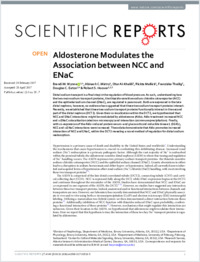Aldosterone modulates the association between NCC and ENAC
- Wynne, Brandi M. Division of Nephrology, Department of Medicine, Emory University, Atlanta, USA - Center for Cell and Molecular Signaling, Emory University, Atlanta, USA
- Mistry, Abinash C. Division of Nephrology, Department of Medicine, Emory University, Atlanta, USA
- Al-Khalili, Otor Department of Physiology, Emory University, Atlanta, USA
- Mallick, Rickta Division of Nephrology, Department of Medicine, Emory University, Atlanta, USA
- Theilig, Franziska Department of Medicine, University of Fribourg, Fribourg, Switzerland
- Eaton, Douglas C. Department of Physiology, Emory University, Atlanta, USA - Center for Cell and Molecular Signaling, Emory University, Atlanta, USA
- Hoover, Robert S. Division of Nephrology, Department of Medicine, Emory University, Atlanta, USA - Department of Physiology, Emory University, Atlanta, USA - Research Service, Atlanta Veteran’s Administration Medical Center, Decatur, USA
-
23.06.2017
Published in:
- Scientific Reports. - 2017, vol. 7, no. 1, p. 4149
English
Distal sodium transport is a final step in the regulation of blood pressure. As such, understanding how the two main sodium transport proteins, the thiazide-sensitive sodium chloride cotransporter (NCC) and the epithelial sodium channel (ENaC), are regulated is paramount. Both are expressed in the late distal nephron; however, no evidence has suggested that these two sodium transport proteins interact. Recently, we established that these two sodium transport proteins functionally interact in the second part of the distal nephron (DCT2). Given their co-localization within the DCT2, we hypothesized that NCC and ENaC interactions might be modulated by aldosterone (Aldo). Aldo treatment increased NCC and αENaC colocalization (electron microscopy) and interaction (coimmunoprecipitation). Finally, with co-expression of the Aldo-induced protein serum- and glucocorticoid-inducible kinase 1 (SGK1), NCC and αENaC interactions were increased. These data demonstrate that Aldo promotes increased interaction of NCC and ENaC, within the DCT2 revealing a novel method of regulation for distal sodium reabsorption.
- Faculty
- Faculté des sciences et de médecine
- Department
- Département de Médecine
- Language
-
- English
- Classification
- Biological sciences
- License
- License undefined
- Identifiers
-
- RERO DOC 305120
- DOI 10.1038/s41598-017-03510-5
- Persistent URL
- https://folia.unifr.ch/unifr/documents/305960
Statistics
Document views: 65
File downloads:
- the_ama.pdf: 148
